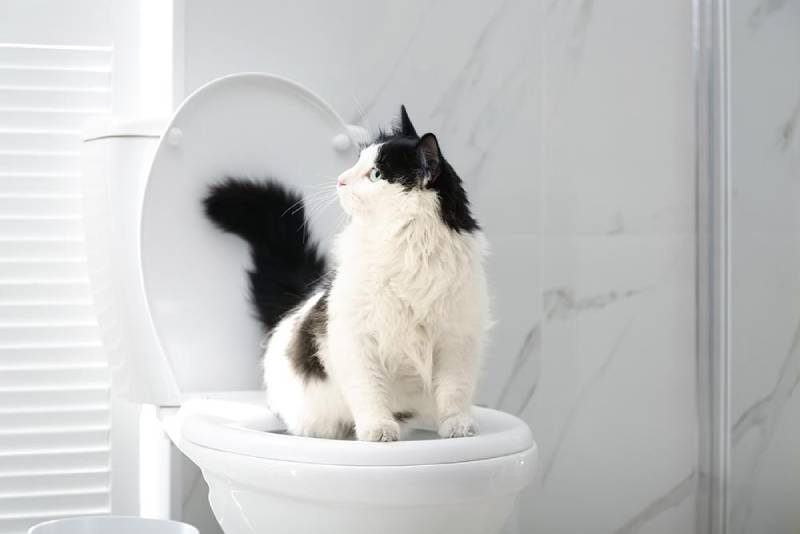Avoid Flush Cat Poop Down Your Toilet - Preserve Your House's Pipe System
Avoid Flush Cat Poop Down Your Toilet - Preserve Your House's Pipe System
Blog Article
Were you trying to find help around Don’t flush cat feces down the toilet?

Introduction
As cat owners, it's vital to be mindful of exactly how we take care of our feline buddies' waste. While it may appear practical to purge cat poop down the toilet, this method can have detrimental effects for both the atmosphere and human health and wellness.
Alternatives to Flushing
The good news is, there are much safer and more accountable ways to dispose of feline poop. Take into consideration the following choices:
1. Scoop and Dispose in Trash
One of the most typical method of disposing of feline poop is to scoop it into a naturally degradable bag and toss it in the garbage. Make certain to use a devoted trash inside story and get rid of the waste promptly.
2. Usage Biodegradable Litter
Go with biodegradable feline litter made from products such as corn or wheat. These trashes are eco-friendly and can be securely thrown away in the garbage.
3. Bury in the Yard
If you have a lawn, consider hiding feline waste in an assigned area away from vegetable yards and water resources. Be sure to dig deep adequate to avoid contamination of groundwater.
4. Set Up a Pet Waste Disposal System
Purchase an animal waste disposal system specifically designed for feline waste. These systems use enzymes to break down the waste, reducing smell and environmental influence.
Health Risks
In addition to ecological issues, flushing pet cat waste can additionally pose wellness dangers to humans. Feline feces might consist of Toxoplasma gondii, a parasite that can trigger toxoplasmosis-- a possibly severe health problem, specifically for pregnant ladies and people with damaged body immune systems.
Environmental Impact
Purging pet cat poop presents damaging microorganisms and parasites right into the water system, posing a significant threat to marine environments. These impurities can adversely impact aquatic life and compromise water top quality.
Final thought
Liable animal possession extends beyond supplying food and shelter-- it additionally involves appropriate waste administration. By refraining from flushing feline poop down the bathroom and going with different disposal techniques, we can reduce our ecological footprint and shield human health and wellness.
Why You Should Never Flush Cat Poop Down the Toilet
A rose by any other name might smell as sweet, but not all poop is created equal. Toilets, and our sewage systems, are designed for human excrement, not animal waste. It might seem like it couldn’t hurt to toss cat feces into the loo, but it’s not a good idea to flush cat poop in the toilet.
First and foremost, assuming your cat uses a litter box, any waste is going to have litter on it. And even the smallest amount of litter can wreak havoc on plumbing.
Over time, small amounts build up, filling up your septic system. Most litter sold today is clumping; it is made from a type of clay that hardens when it gets wet. Ever tried to scrape old clumps from the bottom of a litter box? You know just how cement-hard it can get!
Now imagine just a small clump of that stuck in your pipes. A simple de-clogger like Drano isn’t going to cut it. And that means it’s going to cost you big time to fix it.
Parasitic Contamination
Believe it or not, your healthy kitty may be harboring a nasty parasite. Only cats excrete Toxoplasma in their feces. Yet it rarely causes serious health issues in the cats that are infected. Most people will be fine too if infected. Only pregnant women and people with compromised immune systems are at risk. (If you’ve ever heard how women who are expecting are excused from litter cleaning duty, Toxoplasma is why.)
But other animals may have a problem if infected with the parasite. And human water treatment systems aren’t designed to handle it. As a result, the systems don’t remove the parasite before discharging wastewater into local waterways. Fish, shellfish, and other marine life — otters in particular — are susceptible to toxoplasma. If exposed, most will end up with brain damage and many will die.
Depending on the species of fish, they may end up on someone’s fish hook and, ultimately on someone’s dinner plate. If that someone has a chronic illness, they’re at risk.
Skip the Toilet Training
We know there are folks out there who like to toilet train their cats. And we give them props, it takes a lot of work. But thanks to the toxoplasma, it’s not a good idea.

As a passionate reader on How to Dispose of Cat Poop and Litter Without Plastic Bags, I think sharing that blog post was a good thing. If you please set aside a second to share this content if you liked it. Thanks for going through it.
Show Details Report this page